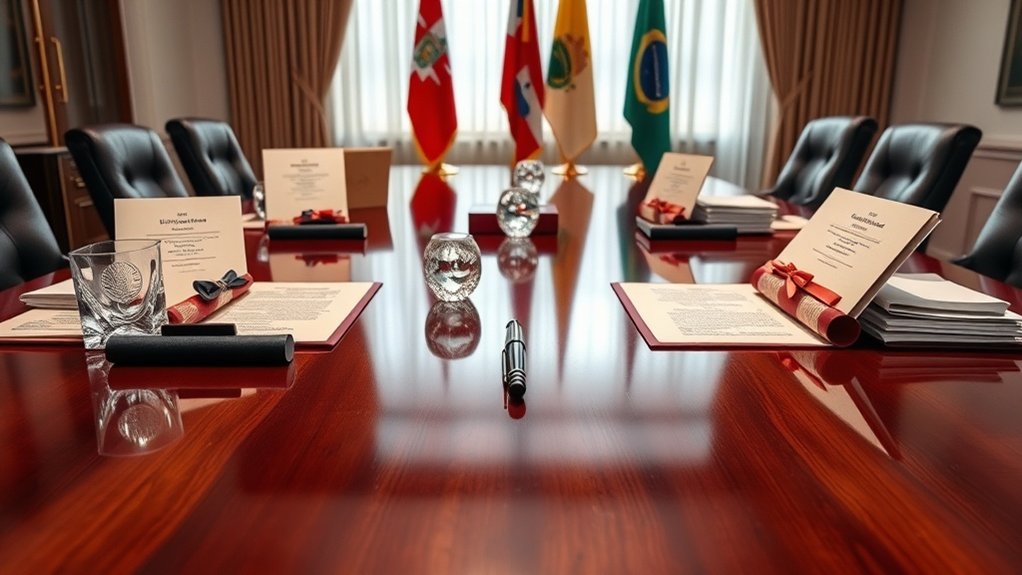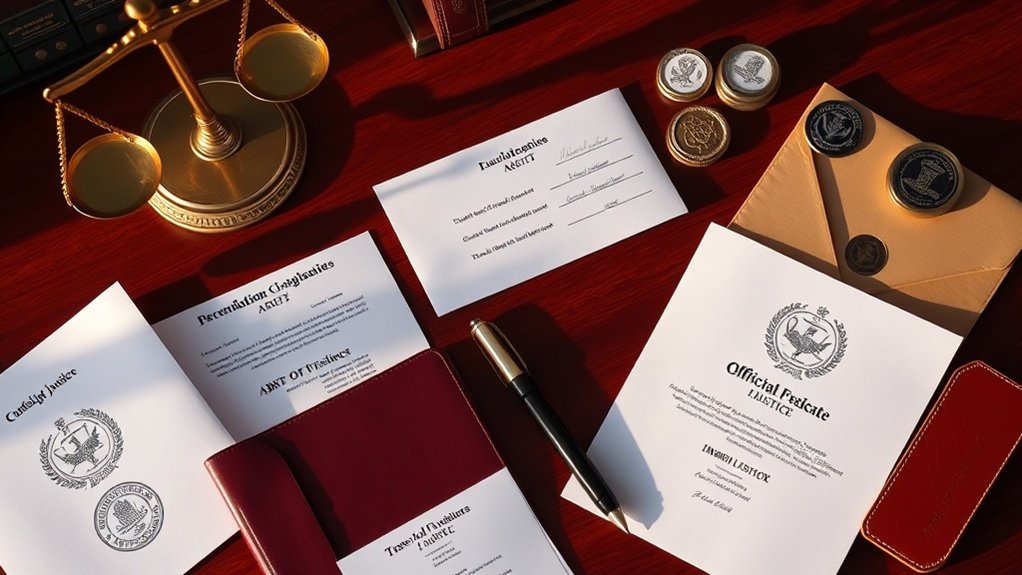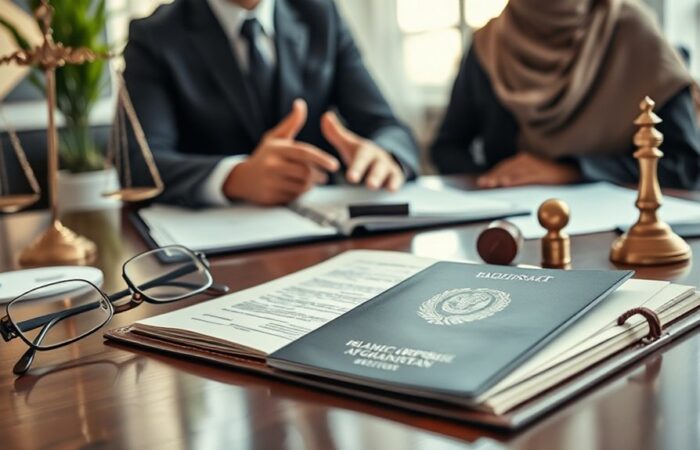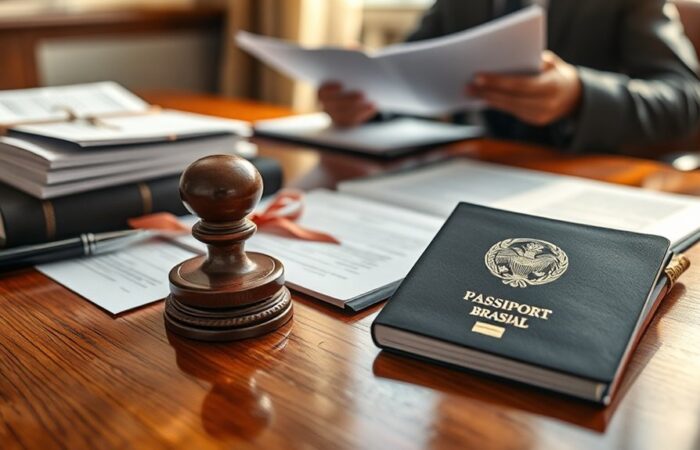You’re facing a critical moment when your immigration dreams hang in the balance, and you can’t afford to have your documents rejected by consulates due to formatting errors or translation inconsistencies. While many translation services claim they’ll meet international standards, the reality is that ABNT compliance requires precise technical expertise that most providers simply don’t possess. The difference between acceptance and rejection often comes down to details you’ve probably never considered.
Understanding ABNT Standards for International Document Translation

When you’re dealing with international legal documents that require sworn translation, understanding ABNT (Brazilian Association of Technical Standards) requirements becomes crucial for ensuring your translations meet official standards.
ABNT establishes specific formatting guidelines that consulates and government agencies expect in sworn translations. You’ll need to follow precise margin specifications, font requirements, and page numbering protocols. The standard dictates proper header formatting, including translator credentials and registration numbers.
Your document structure must include mandatory elements: original text reproduction, faithful translation, and official certification statements. ABNT requires specific terminology consistency throughout the document, ensuring legal terms maintain their precise meanings across languages.
You can’t overlook spacing requirements, paragraph alignment, and signature placement rules. These standards aren’t suggestions—they’re mandatory for document acceptance. When you work with qualified legal translators who understand ABNT compliance, you’re protecting yourself from costly rejections and delays in your international legal proceedings.
Professional immigration lawyers can provide essential guidance on proper document preparation and ensure your sworn translations meet all necessary regulatory requirements for successful application processing.
Why Consulates Require Sworn Translation Services
When you’re dealing with consulates, you’ll find they require sworn translation services because they must verify the authenticity of your legal documents through proper authentication channels. Your documents need to meet strict international standards that only certified sworn translators can provide, ensuring they’re legally recognized across different jurisdictions. You can’t simply submit regular translations because consulates are legally bound to accept only documents that comply with established international protocols for legal document authentication. Without proper legal documentation, you risk facing application denials or unnecessary delays that could significantly impact your immigration timeline and personal plans.
Legal Document Authentication
Because consulates handle sensitive diplomatic and legal matters, they maintain strict authentication standards that require sworn translations for all foreign-language documents. You’ll find that authentication serves as a verification process ensuring document legitimacy and translator qualifications.
| Document Type | Authentication Requirement |
|---|---|
| Birth Certificates | Sworn translation + apostille |
| Marriage Licenses | Certified translator seal |
| Academic Diplomas | Official translation stamp |
| Court Orders | Legal translator certification |
| Power of Attorney | Notarized sworn translation |
When you submit documents without proper authentication, consulates can’t verify their accuracy or legal validity. They’re protecting both governments from fraudulent documentation and ensuring international legal standards are met. Your sworn translator’s credentials must be verifiable through official registries, making authentication a critical step in the consular process. Immigration lawyers emphasize that incorrect form filling and incomplete documentation can lead to potential delays, rejections, or sanctions that severely impact your legal status in Brazil.
International Standards Compliance
International legal frameworks mandate standardized translation protocols that consulates must follow to maintain diplomatic relationships and treaty obligations. When you’re submitting documents for visa applications or legal proceedings abroad, consulates can’t accept just any translation—they need sworn translations that meet specific international standards.
These requirements aren’t arbitrary bureaucracy; they’re established through multilateral agreements and conventions that ensure document authenticity across borders. Your translated documents must include official certification, proper formatting, and complete accuracy to legal terminology. Consulates rely on these standards to verify document legitimacy and prevent fraud.
Without compliance to these international protocols, your documents won’t be recognized by foreign authorities, potentially derailing your legal processes or travel plans entirely. Incorrect documentation can lead to application denials and significant delays in your immigration proceedings, making professional legal guidance essential for navigating these complex requirements successfully.
Legal Document Types That Demand Professional Translation

You’ll encounter specific legal documents that absolutely require professional sworn translation services to meet court and immigration standards. Court documents like judgments, depositions, and legal briefs must be translated by certified professionals to ensure legal validity and accuracy. Immigration papers including birth certificates, marriage licenses, and educational transcripts also demand sworn translations to satisfy government agency requirements. Working with an experienced immigration lawyer ensures compliance with laws and proper handling of these critical translation requirements for visa applications and residency processes.
Court Documents Translation
When you’re involved in legal proceedings that cross international borders, court documents require sworn translations to maintain their validity and legal standing. You’ll need certified translations for judgments, court orders, subpoenas, depositions, and witness testimonies when submitting them to foreign courts or authorities.
These documents contain critical legal terminology that demands precise translation to preserve their original meaning and intent. You can’t afford mistranslations that might compromise your case or create legal complications. Court-issued documents must retain their authenticity through proper sworn translation services that meet international standards.
Whether you’re pursuing litigation abroad or presenting foreign court documents domestically, you’ll need translators who understand both legal systems and can provide translations that courts and consulates will accept without question. Professional guidance is essential to ensure your translated court documents meet all legal requirements and avoid potential complications that could jeopardize your case.
Immigration Papers Requirements
Immigration authorities across the globe require sworn translations for virtually every foreign-language document you submit with your application. You’ll need certified translations for birth certificates, marriage licenses, divorce decrees, academic transcripts, diplomas, criminal background checks, and employment records. Consulates won’t accept documents in your native language without proper translation certification. Each country maintains specific formatting requirements that translators must follow precisely. Brazilian documents heading to U.S. consulates need ABNT-style formatting, while European destinations often require different standards. You can’t risk rejection due to improper translation format or missing certifications. Professional legal translators understand these nuanced requirements and ensure your documents meet exact specifications. Don’t jeopardize your immigration timeline with substandard translations that consulates routinely reject. Specialized legal guidance becomes crucial when navigating these documentation requirements, as experienced immigration lawyers understand which translated documents are essential for each visa type and can prevent costly delays in your application process.
The Certification Process Behind Sworn Translations
Precision marks every step of the sworn translation certification process, transforming standard document translation into legally recognized evidence. You’ll find that certified translators follow strict protocols to ensure your documents meet international legal standards.
The certification process involves several critical stages that guarantee authenticity and accuracy:
- Document verification – The translator confirms original document integrity and completeness
- Professional translation – Certified linguists translate content while preserving legal terminology and formatting
- Quality assurance review – Independent verification ensures translation accuracy and compliance with destination country requirements
- Official certification – The translator affixes their official seal, signature, and certification statement
You can’t skip any step without compromising the document’s legal validity. Each certified translation includes a formal declaration stating the translator’s qualifications and affirming the translation’s accuracy. This comprehensive process ensures consulates, courts, and government agencies worldwide accept your sworn translations without question, protecting your legal interests across borders. Professional legal representation ensures your translated documents comply with complex immigration regulations and increases the likelihood of successful visa applications.
Common Rejection Reasons for Improperly Translated Documents

Despite following what appears to be proper translation procedures, your documents can still face rejection if they don’t meet specific technical and legal requirements. Understanding these common pitfalls helps you avoid costly delays and resubmissions.
| Rejection Reason | Impact |
|---|---|
| Missing sworn translator’s seal or signature | Complete document invalidation |
| Incorrect formatting or layout inconsistencies | Processing delays up to 30 days |
| Untranslated official stamps or watermarks | Immediate rejection by consulates |
You’ll face rejection when translations lack proper apostille certification for international use. Incomplete translator credentials, such as missing registration numbers or expired certifications, trigger automatic denials. Documents containing handwritten notes that aren’t properly translated also get rejected.
Technical issues include poor scan quality, misaligned text, or missing pages from multi-page documents. Legal terminology errors or inconsistent name spellings across documents create additional problems. Ensuring your sworn translator follows ABNT formatting standards prevents most technical rejections.
Errors during the process can lead to visa denials and create significant legal obstacles that may affect your immigration timeline and future applications.
Quality Assurance Measures for International Document Acceptance
Before your translated documents reach international authorities, implementing a systematic quality assurance process significantly reduces rejection rates and ensures compliance with global standards.
You’ll need thorough verification protocols that examine every aspect of your sworn translations. Professional translators must validate accuracy against source documents while ensuring cultural nuances don’t compromise meaning. Technical terminology requires specialized attention, particularly in legal and medical contexts where precision determines acceptance.
Essential quality measures include:
- Document formatting verification – Ensuring layouts match original structures and maintain official appearance standards
- Certification compliance checks – Validating all required stamps, seals, and translator credentials meet destination country requirements
- Cross-referencing accuracy – Comparing translated content against source materials for consistency and completeness
- Final proofreading protocols – Conducting comprehensive reviews to eliminate errors before submission
You can’t afford shortcuts when international acceptance depends on flawless execution. Consulates routinely reject documents containing minor inconsistencies, making rigorous quality assurance your strongest defense against costly delays and resubmission requirements. Experienced legal support prevents costly bureaucratic errors that commonly occur during document preparation and submission processes.
Streamlining Your Immigration and Legal Processes Through Expert Translation

With quality assurance protocols protecting your documents from rejection, you can now leverage expert translation services to accelerate your entire immigration and legal journey. Professional translators who understand consulate requirements eliminate the back-and-forth revisions that delay your applications.
You’ll save weeks by getting translations right the first time. Expert translators familiar with ABNT standards and consular preferences know exactly which terminology and formatting requirements each institution expects. They’ve handled thousands of similar cases and anticipate potential issues before they arise.
When you work with experienced legal translation professionals, you’re not just buying a service—you’re accessing specialized knowledge that prevents costly delays. Your visa applications move through processing faster when accompanied by properly formatted, accurately translated documents that meet specific consular standards.
This expertise transforms what’s typically a stressful, time-consuming process into a streamlined experience where your documents work for you, not against you.
Frequently Asked Questions
How Long Does Vieira Braga Advogados Take to Complete Sworn Translations?
You’ll typically receive your completed sworn translations within 3-5 business days for standard documents. If you’re dealing with complex or lengthy materials, the timeline might extend to 7-10 business days. You can request expedited service if you’re facing tight deadlines, which usually reduces the turnaround time to 24-48 hours for an additional fee. They’ll confirm specific timing when you submit your documents.
What Are the Specific Fees for Different Document Types at Vieira Braga?
You’ll find Vieira Braga’s fees vary by document type and complexity. Standard documents like diplomas, transcripts, and certificates typically cost between R$80-150 per page. Legal documents such as contracts, powers of attorney, and court orders range from R$100-200 per page. Complex technical documents or medical records may cost R$150-250 per page. They’ll provide you with an exact quote after reviewing your specific documents and requirements.
Does Vieira Braga Offer Expedited Translation Services for Urgent Consulate Deadlines?
You’ll need to contact Vieira Braga directly to confirm their expedited translation services for urgent consulate deadlines. Most professional translation firms offer rush services with additional fees and shorter turnaround times. They’ll likely accommodate your urgent needs, but you should inquire about their specific expedited options, associated costs, and guaranteed delivery timeframes to ensure they can meet your consulate’s deadline requirements effectively.
Which Languages Does Vieira Braga Advogados Specialize in for Sworn Translations?
You’ll find that Vieira Braga Advogados specializes in Portuguese-English and English-Portuguese sworn translations, as these are the most commonly requested language pairs for consulate submissions. They’re particularly experienced with translating documents between these languages since most international consulate requirements involve English translations of Portuguese documents or vice versa. Their translators are certified and experienced in both language directions for official documentation.
Can Vieira Braga Handle Notarization and Apostille Services Alongside Their Translations?
Yes, you’ll find that Vieira Braga can handle notarization and apostille services alongside their sworn translations. They’ve streamlined their process so you don’t need to visit multiple offices for document legalization. You can get your documents translated, notarized, and apostilled through their comprehensive service package. This saves you time and ensures your documents meet all international requirements for consular acceptance and official use abroad.
Conclusion
You can’t afford translation mistakes when your future depends on document acceptance. Vieira Braga Lawyers’ certified team delivers ABNT-compliant sworn translations that consulates trust and approve. You’ll avoid costly delays, rejections, and resubmissions that derail your immigration timeline. Don’t gamble with inexperienced translators who miss critical formatting requirements. Choose proven expertise that understands international standards and legal terminology. Your documents deserve professional handling that gets results the first time.


